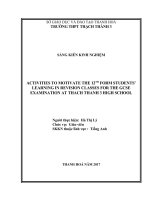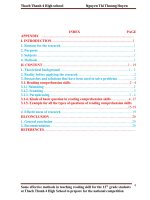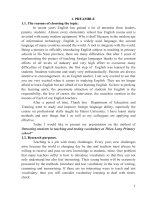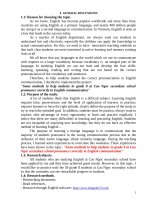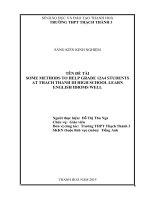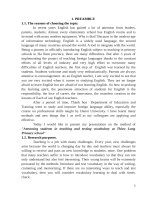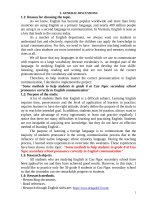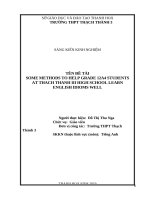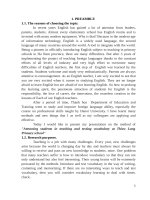Some methods to help students at thach thanh i high school master word stress
Bạn đang xem bản rút gọn của tài liệu. Xem và tải ngay bản đầy đủ của tài liệu tại đây (166.1 KB, 26 trang )
THANH HOA EDUCATION AND TRAINING DEPARTMENT
THACH THANH I HIGH SCHOOL
EXPERIENTIAL INITIATIVE
some methods to help students AT thach thanh i
HIGH SCHOOL master word stress
Author: Vũ Thị Xuân
Occupation: Teacher
Experiential initiative on: English
THANH HOA, YEAR 2021
INDEX
N0
CONTENTS
PAGE
1
1. INTRODUCTION
1.1. Reasons for the study
1.2. Aims of the study
1.3. Scope and object of the study
1.4. Study method
2
2
2
2
2
2
2. STUDY CONTENT
2.1. Theoretical rationale of the study
2.1.1. What is English stress
2.1.2. Why do we need to master stress
2.1.3. How do we learn stress
2.2. Status of the study problem
2.2.1. For the teachers
2.2.2. For the students
2.2.3. For objective factors
3
3
3
3
4
4
4
4
4
6
6
16
17
17
19
2.3. Solutions
2.3.1. During English lesson
2.3.2. Some rules to master word stress in English
2.3.2.1. Phonetic stress
2.3.2.2. Word stress with suffix
2.3.2.3. Word stress for compound nouns and reflexive
pronouns
2.4. Study effects
3
3. CONCLUSION, PROPOSALS
3.1. Conclusion
3.2. Proposals
19
20
20
20
2
1. INTRODUCTION
1.1. REASONS FOR THE STUDY
It’s easy to see just how important English is around the world. Therefore,
more and more people are dedicating time to studying English as a second
language because English is the most commonly spoken language in the world.
One out of five people can speak or at least understand English. Whether we are
looking for a job, taking an exam or planning to travel the world, studying
English can help us progress in both personally and professionally.
Phonetics is considered as one of the basic elements of all languages in the
world. If the pronunciation is correct, all skills such as listening, speaking,
reading will become much easier. On the contrary, if the pronunciation is wrong
or unclear, it will make the listener misunderstand or even not understand the
speaker's meaning.
To support the correct pronunciation of English words, hitting the correct stress
will bring success in communication in general and in exams in particular. In
order for the other person to understand the content of the sentence they want to
express, in addition to pronouncing the correct word to avoid misunderstanding,
it is also important to use stress for words in a sentence. However, the fact that
many students pronounce the wrong words and stress incorrectly is still very
common due to the lack of grasping the pronunciation and stressing rules or
perhaps due to the application of long, rambling rules, hard to remember.
Having identified the problem, I have tried to search for solutions to help
students learn word stress more efficiently. Thus, in this writing I would like to
share “ Some methods to help students at Thach Thanh I High school
master word stress ” with the hope that my colleagues can also considered my
teaching strategies as useful suggestions to help their students become more
interested and confident in speaking English.
1.2. AIMS OF THE STUDY:
- Helping students at Thach Thanh I High School know how to pronounce
English words correctly.
1.3. SCOPE AND OBJECT OF THE STUDY
- Scope: Research subjects are students at Thach Thanh I High School, school
year 2020-2021.
- Object: This subject is concerned with ways of teaching word stress in the
class.
1.4. The study method
- Finding out difficulties that students have in English classes
3
- Research methodology through the documents: Book of Applied Informatics,
Internet, textbooks 12, teacher books, exercise books and related documents.
- Observing and drawing out experiences.
- Research Methodology of actual survey, gathering information and data
processing.
2. STUDY CONTENT
2.1. The theoretical rationale of the study
2.1.1. What is English stress?
Have you ever heard a very fast saying from a foreigner and did not
understand anything? Or do you say a sentence that makes the person facing you
also not understand? That is because you do not know how to grasp word stress
in English. If you set wrong syllable stress or say words without stress, you will
have difficulty in both speaking and listening when communicating in English.
There will be an accent in each word. Stress is a syllable that is pronounced
louder and clearer, with more emphasis on other syllables in a word, used to
distinguish one word from another. When you look up in a dictionary, you will
identify word stress by the symbol (‘) before the syllable is stress.
In English, there are many words written the same but will have different
meanings, different types of words if the stress is different. Therefore, if you do
not pronounce the stress correctly, the listener will not understand or
misunderstand what you are saying. For example, the word desert, if it is a noun
stress falls on the first sound / ˈdezərt / and means a dry, barren area of land, if
it is a verb, stress falls on the second sound / dɪˈzɜrt / and means neglect.
According to Peter Roach in "English phonetics and phonology," the stress of a
word is pronounced more prominently than the other. Stressed sounds have at
least four distinct characteristics:
-
Have a louder volume than the rest of the sound
Have a longer length than the other sounds
Have a higher pitch than the rest of the sound
The vowel of a stressed sound is different from the other vowels in the
same word
2.1.2. Why do we need to master stress?
First, stress distinguishes one word from another when listening to and speaking
English, because misplaced stress can cause misunderstanding to different words
with different meanings. In fact, there are many "half-hearted and funny"
4
situations that happen just because speaking English has no stress and the
listener understands it differently. This is extremely dangerous if you use
English to communicate with customers, foreign partners.
Second, stress helps to emphasize and convey important information. If you
know the word stress well, you can hear and capture information very well even
though people "speak fast like the wind".
Third, stress creates the natural intonation of the sentence, making the English
voice flexible, professional, and in a native-like style. Without stress, words
become boring, unattractive, reading English as if it were Vietnamese
transcription. A statement with up and down intonation will certainly appeal to
the listener much more than a flat statement, all without emotion.
2.1.3. How do we learn stress?
Like all language knowledge, stress has its own rules. Learners can buy
books about stress and follow the rules in them. With fixed rules, learners only
need to memorize and do lots of exercises. However, the rules have exceptions.
Learners need to pay more attention to these exceptions.
In addition, learners can learn stress in many different ways such as: learning in
communication, learning while listening to the teacher lectures, learning when
listening to programs played in English, or by looking up a dictionary. And only
regular practice and practice can help people learn successfully on the path of
conquering the language.
2.2 Status of the study problem
2.2.1. For the teacher:
Most teachers understand the importance of word stress, especially for high
school students. But until now there are many teachers who are fearful and
confused of the ways to teach stress. They are not confident of when to teach,
how much time they should spend on stress and especially how to present them
clearly and comprehensibly.
2.2.2. For the students:
Most students have no concept of stress in English pronunciation. Students
may know about stress by looking at the Glossary section at the end of the
textbook. However, many students do not watch this part or only pay attention to
the meaning of the word without paying attention to the pronunciation or stress
of the word.
2.2.3. For objective factors
5
- Difficult to remember and apply
The rule of determining stress is already there, but it is a very difficult process to
memorize in theory and apply it to the lesson. You need to do and read a lot to
be able to deeply remember the learned rules, thereby forming the ability to
reflect and analyze with new words.
- Difference between Vietnamese and English
Vietnamese is a monosyllabic language with built-in tones so you won't need a
headache because of defining stress. But English is different. English is a multisyllable language with complex features of stress and intonation. The daily use
of Vietnamese has gotten your brain used to simplifying intonation and stress,
now you have to memorize a bunch of complex rules. Isn't it difficult?
- There are rules but there are exceptions
In school, after teaching you many rules about stress, teachers always end with
the word "but". This "but" makes your knowledge indeterminate, as there are
many exceptions beyond the rules.
These are the problems that urge me to find out the solutions to help students get
over the difficulties and hold interest in the foreign language in a flexible and
easy way. To know exactly about the problem, at the beginning of the school
year, I investigated 76 in two classes before applying “ methods to teach word
stress” by asking them to do the following questionnaire. The questionnaire is
about the students’ ability of using English stress in grades 12A10 and 12A9 of
Thach Thanh I High School with the same level. I gave each student a 5question English stress questionnaire and asked them to do it within 7 minutes.
The words on the questionnaire were selected from unit 1 of the 12 th grade
English textbook when the students have just finished this lesson.
The questionnaire is as follows:
Choose the word whose stress pattern is different from that of the rest.
1
A. caring
B. secure
C. willing
D. project
2
A. family
B. active
C. discuss
D. happy
3
A. garbage
B. mischievous C. daughter
D. member
4
A. reserved
B. importance
C. photograph
D. decide
5
A. secondary
B. attempt
C. biologist
D. obedient
Here are the results:
6
Sts’
num
ber
Class
12A9
37
12A10
39
5 correct
answers
4 correct
answers
SL
SL
4
2
%
10,8 5
%
5,1
5
%
%
13,5
%
12,8
%
3
2
1 correct
correct correct
answer
answers answers
S
% SL % SL %
L
4 10,8 8 21,6 10 27%
%
%
5 12,8 7 17,9 8 20,5
%
%
%
0 correct
answer
S
L
6
%
16,2
%
12 30,7
%
From the above results, it can be seen that only about 30% of students
achieve the average or above with knowledge of stress and about 20% of
students do not correct any questions about stress. After the students had
finished their answers, I continued to ask some students to pronounce words on
the ballot at random. As a result, most of the children did not pronounce the
word stress correctly, even if they answered all 5 questions on the questionnaire
correctly. Thus, it can be seen that students' knowledge of stress is relatively
weak. Even those who understand the theory are weak in practice.
2.3. SOLUTIONS
2.3.1. During English lessons
Measure 1: When teaching new words I always focus on the stress of
words by using the stress mark for new words and ask students to write the
whole part in their notebooks. When I let students read words, I also pay
attention to correct them if they see that they are not reading the stress correctly
by re-pronounce the word they read wrong and ask them to read it correctly.
Measure 2: When using English, I always pay attention to correct accent
and intonation to guide and create habits for students to listen correctly. In order
to do this, I always have to practice my speaking skills properly in many ways
such as listening and practicing according to tape, using dictionary to look up
words I am not sure about, listening to broadcast programs broadcast in English
on television or radio
Measure 3: This is the measure used in Language focus periods of Unit 3,
Unit 4 and Unit 5. Because the time for stress in each Language Focus period is
only from 10 to 15 minutes, so there is only enough time for students to listen to
tapes and repeat the pronunciation of words. Teachers don't have time to explain
to students some general rules regarding stress. Therefore, students can only
grasp the stress of words in the textbook. So before every Language Focus
periods of these lessons, I ask students to preview the “stress” at home.
7
In class, I proceed to teach stress as follows:
- First, I let students listen to the tape 1 time to recognize word stress and then
ask students to repeat the tape twice.
- I check the word stress positions to see if the students have mastered them
correctly.
- Tell students to listen to the part "Practise reading aloud the sentences" and call
some students to read it again.
Measure 4: Before each period, I prepare 2 multiple-choice questions
about stress with the requirement “Choose the word whose stress is differently
placed from the other words”. The words selected in these 2 questions are the
words that will be used during that class. These two questions can be written in
the sub-chart first. At the end of each period, I spend from 30 seconds to 1
minute for students to answer the two questions and pronounce these words.
The questions for each section are listed in the following table.
Unit 1
Reading
A. pressure
B. supportive
C. possible
D. parent
A.problem
B. household
C. caring
D. believe
A. before
B. decision
C. important D. personal
A.family
B. secret
C. person
D. member
A. together
B. dinner
C. leftover
D. children
A. excited
B. often
C. crowded
D. rarely
A. permit
B. different
C.grandfather D. idea
A. prepare
B. allow
C. finish
D. discuss
A. party
B. listen
C. enjoy
D. married
A. central
B. expensive
C.interesting D.anywhere
Unit 1
Speaking
Unit 1
Listening
Unit 1
Writing
Unit 1
Language
Focus
8
Unit 2
A. traditional
B.contractual C. marriage
D.difference
A. maintain
B. physical
C. majority
D. reject
Reading
Unit 2
Speaking
A. generation
B. happy
C. public
D. grocery
A. country
B. holiday
C. precede
D. income
A. banquet
B. ceremony
C. exchange
D. altar
A. envelope
B. attend
C. ancestor
D. schedule
Unit 2
Listening
Unit 2
Writing
A.conical
B. picture
C. symbol
D.Vietnamese
A. culture
B. attractive
C. protect
D. material
A. police
B.decide
C. arrest
A. several
B. grateful
C.photography D. thousand
Unit 2
D.neighbour
Language Focus
Unit 3
Reading
A. assistance
Unit 3
Speaking
Unit 3
Listening
B. attention
C. situation
D. attract
A.appropriate B. verbal
C. signal
D. airport
A. beautiful
B. perfect
C. today
D. terrible
A. colour
B. dancer
C. really
D.American
A. consider
B. installed
C. attack
D.regulation
A. marvellous
B. argument
C. really
D.maximum
A. depend
B. observe
C. Abruptly
D.necessary
A. action
B. apology
C. common
D. difficult
Unit 3
Writing
9
Unit 3
A. company
B. successful
C. because
D. discuss
A. explain
B. marketing
C. office
D. visit
C. January
D.curriculum
Language Focus
Unit 4
A.compulsory A.September
Reading
A. system
B.environment C.goverment D. February
Unit 4
A. secondary
B. primary
C. education D. nursery
Speaking
A.examination B. national
C. optional
D. lower
A. methodical B. teacher
C. actually
D. carefully
A. behave
B. always
C. listen
D. struggle
A. early
B. upper
C. formal
D. academic
A. follow
B. suggestion
C. system
D.writing
A. algebra
B. chemistry
C. physical
D.computing
A. typical
B. normally
C. surprise
D. medicine
A. roommate
B. campus
C. graduate
D. engineer
A. colleges
B. challenge
C. inflation
D. library
A. applicant
B. entrance
C. letter
D. result
A. application
B. certificate
C. identity
D. require
Unit 4
Listening
Unit 4
Writing
Unit 4
Language Focus
Unit 5
Reading
Unit 5
Speaking
10
Unit 5
A. proportion B. rural
C. majority D. tutorial
A.appointmen B.internationa C.agricultur
t
l
e
D.university
Listening
Unit 5
B.undergradua
Writing
A. tertiary
te
C.informatio
n
D.introduction
A. supply
B. tuition
C. provide
Unit 5
A.mathemati
cs
Language
Focus
A. allow
Unit 6
C.archeolog
B.geographical y
B.philosop
hy
C.address
A. stressful
Reading
D. section
A. vacancy
B.impression
C.candidate
B.experience C. position
D.proficiency
D.language
D.concentrate
D.enthusiasm
Unit 6
A. fascinating
Speaking
A. pilot
Unit 6
A. category
A.service
Language Focus
D.waiter
B.construct
C.condition
D.computer
B.retail
C.workforce
D.wholesale
B.lawyer
my
D.worker
y
B. diploma
C.express
D. interest
A.apply
B.character
C.level
D.travel
A.classroom
B.schoolyard
C.cowboy
D. discover
A.several
B.recovered
C.arrow
D.money
A.dissolve
B.domestic
C.subsidy
D. eliminate
A.measure
B.inflation
C.stagnant
D.foreign
Unit 6
Unit 6
C.irrigation
C.econo
Listening
Writing
B.customer
A.accompan
Unit 7
Reading
11
Unit 7
C.encoura
A.technique
B.policies
ge
D.efficiently
C.draina
Speaking
A.salary
B.scholarship ge
D.facilities
Unit 7
A.rationally
B.eventually
A.negative
B.unfortunately
C.discourage
D. illegal
C.solution
D.discover
Listening
Unit 7
A.decade
B.forestry
C.reform
D. situation
A.economic
B. people
C.fishery
D.better
A.important
B.distance
C.recognize
D. manage
A.myself
B.vacation
C.English
D.advise
Writing
Unit 7
Language Focus
Unit 8
A. pessimistic B.optimistic
C.unexpect
ed
D.contribute
A.security
C.disappear
D.invention
C.Standard
D. Disease
Reading
B.technology
Unit 8
Speaking
A.Chinese
B. declare
A.atmospher
e
B.prediction
C.science
D. fatal
Unit 8
Listening
A.incredible B.eradicated C.fatal
A.mushroo
B.expecta
m
ncy
C.curable
D. eternal
D.general
Unit 8
A. conflict
B. harmony
C. desire
D. violent
B. organize
C. concern
D.employment
Writing
A. together
12
Unit 8
Language Focus
A. across
B. butcher
C. cancer
D. famous
A. opposite
B. business
C. among
D. contract
A. desert
B. sandy
C.hummock
D. antelope
A. comprise
B. enormous
C. acacia
D. colony
A. season
B.expedition
C. rainfall
D. camel
A. animal
B. climate
C.important D. buffalo
A. location
B. rabbit
C. needle
D. human
A. develop
B. become
C. cover
D. around
Unit 9
Reading
Unit 9
Speaking
Unit 9
Listening
Unit 9
A.information B.composition C. tableland
D. elevation
A. feature
B. exist
D. summer
A. correct
B. umbrella
C. raincoat
A. sentences
B. begin
C.remember D.excitement
Writing
Unit 9
Language Focus
Unit 10
Reading
C. winter
D. money
A. extinction
B. destroy
C. habitat
D. depend
A. effort
B. species
C.temperature
D.destruction
Unit 10
A. forest
B. hunting
C.mountain
D. illegal
Speaking
A.endangered
B.tropical
C. bamboo
D. decline
Unit 10
A. mother
B. peaceful
C. picture
D. repeat
A. hunter
B. baby
C. attain
D. sociable
Listening
13
Unit 10
Writing
A. problem
B.
C. polluted
D. enough
A. condition
awareness
B. product
C. begin
D. reserve
A. Careful
B. carrot
C. canal
D. children
A. manage
B. footpath
C. decide
D.Christmas
Unit 10
Language Focus
Unit 11
A. television B. different
C. subject
D. again
A. people
C.information D.entertainment
Reading
B.understand
Unit 11
B.conversati
A.quickly
on
C.character
D.following
A.practise
B.parent
C.enjoy
D.moment
A. reunited
B.survive
C.unnoticed
D.resolve
A.wilderness
B.family
C.character
D.recommend
Speaking
Unit 11
Listening
Unit 11
C.conclusio
A. summary
B. content
n
D. title
A. recently
B. correct
C. result
D. partner
A. machine
B. hotel
C. district
D.sunny
A. pleasant
B. possible
C. prepare
D. tourist
Writing
Unit 11
Language Focus
Unit 12
C.movemen
A. commit
B.eject
t
D. award
A. period
B. vertical
C. penalty
D. interfere
Reading
14
Unit 12
B.windsurfi
A.individually ng
C. regulator
D. referee
Speaking
A. appopriate
Unit 12
Listening
Unit 12
Writing
Unit 12
Language Focus
B.adventurous C. attack
D.dangerous
A. equipment B.championship
C. perform
D. event
A. formal
C. method
D. national
C. apart
D. action
A. exercise
B. instruction C. above
D. ahead
A. accident
B. supply
C. handsome D. awful
A. happen
B. exist
C.interest
A. festival
B. participate
A. medal
B. composed
C.volleyball D. excellent
C.impressiv
e
D. prepare
A. athletics
B. athlete
C.swimming D. football
B. publicity
A. example
B. position
D.postman
Unit 13
Reading
Unit 13
Speaking
A. reason
B. result
C. final
Unit 13
D. rival
C.Vietnames
A.competition
B. employee
e
D.restaurant
A. newspaper
B. decide
C. proposal
D. compete
Listening
Unit 13
A.weather
B. attitude
C. spectator
D. striker
Writing
A.competition B.introduction C.combination D.description
Unit 13
A. picture
B. sentence
C. nervous
D. arrive
A. improve
B. practise
C. difficult
D. birthday
Language Focus
15
Unit 14
A. epidemic
B. dedicate
C. victim
D. mission
A. adopt
B. propose
C.federation
D. initiate
A.development B. possible
C. agency
D.basic
A. partner
B. animal
C.poverty
D.education
A. member
B. peaceful
C. except
D. homeless
A. establish
B. agreement
C. against
D. several
Reading
Unit 14
Speaking
Unit 14
Listening
Unit 14
A. suggestion B. biology
C. research
D.mountainous
A. different
C. improve
D. salary
Writing
B. charity
Unit 14
A. clothes
B. minute
C. Japanese
D. handbag
A. explode
B. recorder
C. recover
D. wildlife
C. politics
D. control
Language Focus
Unit 15
A.involvement B. society
Reading
A. believe
B.housework C. basis
Unit 15
A. husband
B. tradition
C. extent
Speaking
A.sympathetic
B.knowledge C.education
A.African
B.average
C.collecting
B.fini
sh
C. typical
D.advocated
D.decision
D.independent
Unit 15
Listening
A.produce
D.firewood
D.farmwork
16
Unit 15
A. status
B. illustrate
C. number
B.entertainmen
t
C. married
Writing
A. children
D. unequal
D. marital
Unit 15
A. holiday
B. parent
C.explain
Language
Focus
A.prohibit
B.interest
C. condition D.appropriate
Unit 16
A. economic B.cooperation C.population D.transportation
Reading
A. situation
B. industry
C. justice
D. scissors
D.tourism
Unit 16
A. language
B. religion
C. currency
D. session
Speaking
A. leader
B. total
C. official
D. capital
A. himself
B. Buddhism
C. include
D. submit
A. quarter
B. second
C. exist
D. million
A. wonderful
B. seafood
C. famous
D. ideal
A. excellent
B. vacation
C. hotel
D. centre
A. merry
B. invite
C. Tuesday
D. danger
C. graduate
D. danger
Unit 16
Listening
Unit 16
Writing
Unit 16
Language focus
A.somewhere B. rebuild
2.3.2. Some rules to stress words in English
To understand the stress of a word, we must first understand what a
syllable is. Each word is composed of syllables. A syllable is a unit of
pronunciation that has one vowel sound. A word might have one syllable (like
“an” or “can”) or more, such as “po-lice” (two syllables), “com-pa-ny” (three
syllables), “ne-ce-ssa-ry” (four syllables), etc.
17
2.3.2.1. Phonetic stress
Rule 1: Stress is never on the / ə / or the / əʊ / sound.
For example:
- mother / ‘ mʌðə/ : stress falls on the first sound because the 2nd sound contains
the / ə / sound
- hotel/həʊˈtel/ : stress falls on the 2nd sound because the 1st sound contains
the /əʊ/ sound.
Note: If there are both / ə / and / əʊ / in a word, the stress falls on the part that
contains the / əʊ / sound.
For example:
- ago /əˈɡəʊ/: stress falls on the 2nd sound
- alone /əˈləʊn/, stress falls on the 2nd sound
- open /ˈəʊ.pən/, stress falls on the first sound
Rule 2: Stress often falls on a long vowel, a double vowel, or a final sound
that ends with more than one consonant
For example:
- disease/ di’zi:z/ stress falls on the 2 nd sound because the 2nd sound contains the
long vowel /i:/
- explain / ik’splein/ : stress falls on the 2 nd sound because the 2nd contains the
double vowel /ei/.
Rule 3: if all sounds are short, the stress falls on the first syllable
For example:
- happy /ˈhæp.i/ : stress falls on the first sound because both /æ/ and /i/ are short
sounds
- animal/ ‘æniməl/: stress falls on the first sound because /æ/ /i/ and /ə/ are
short sounds
2.3.2.2. Word stress with suffix
Rule 1: Words with the suffix are - ee, - eer, - ese, - ique, - esque, - ain, - oo,
- oon, -ette, - ade, - mental, -nental, the stress will fall on that syllable.
For example:
- lemonade /ˌlem.əˈneɪd/
- Chinese /tʃaɪˈniːz/
- pioneer /ˌpaɪəˈnɪər/
- kangaroo /ˌkæŋ.ɡərˈuː/
- typhoon /taɪˈfuːn/
- environmental /ɪnˌvaɪ.rənˈmen.təl/,…
18
Rule 2: words with the suffix are - ion, - ic, - ial, - ive, -ible, - ity, - graphy, ious, -eous, - ish, - ian, the stress is going to be on the syllable right before
the suffix
For example:
- decision /dɪˈsɪʒ.ən/
- attraction /əˈtræk.ʃən/,
- librarian /laɪˈbreə.ri.ən
- economic/ i:kə’nɒmik/
- expensive/ ik’spensiv/
Rule 3: Words with the suffix – y,- ate, -ce,-ise/ize, -ism/izm, the stress falls
on the 3rd syllable from the bottom up.
For example:
- Communicate /kəˈmjuː.nɪ.keɪt/
- regulate /ˈreɡ.jə.leɪt/
- classmate /ˈklɑːs.meɪt/
- technology /tekˈnɒl.ə.dʒi/
- emergency /ɪˈmɜː.dʒən.si/
- paradise /ˈpærədaɪs /,
- compromise/’kɑmprə,maɪz/…
Rule 4: Words with the suffix are - ist, - ly, - al,- age, - ure, -ledge, - ing, - ed,
-dom, -some,-ent/ ant, - ment, - ship, - ness, - er / or, - hood, - ing, - en, - ful,
- able, - ous, - less, the main stress of the original word does not change.
Examples:
- agreement / əˈɡriːmənt /
- meaningless / ˈmiːnɪŋləs /
- reliable / rɪˈlaɪəbl /
- poisonous / ˈpɔɪzənəs /
- happiness / ˈhæpinəs /,…
2.3.2.3. Word stress for compound nouns and reflexive pronouns
Rule 1: compound noun:
A compound noun is a noun made out of two nouns that form one word. In a
compound noun, the most stress is on the stressed syllable of the first word.
Examples:
- SEAfood (sea + food)
- ICEland (ice + land)
- TOOTHpaste (tooth + paste)
- FOOTball (foot + ball)
- BAsketball (basket + ball)
19
Rule 2: Reflexive pronouns:
Reflexive pronouns show that the action affects the person who performs the
action. The second syllable usually takes the stress.
Examples:
- mySELF
- themSELVES
- ourSELVES
2.4. The study effects
To evaluate the results of the process of implementing the topic and have
a comparison, I have tested the ability to find accents and correct pronunciation
at the end of the 2nd term in two classes: grade 12A9 (the grade was
implemented with these methods) and class 12A10 (the class was not
implemented with these methods). Students worked on a 5-question multiple
choice questionnaire in 7 minutes. Then, I checked the cards and got some
students to read out the words. The students being called could be either students
who did all five correctly or students who did not get any correct answer
An English stress ability test sheet has the following contents:
Choose the word whose stress pattern is different from that of the rest.
1. A. accelerate
B. philosopher
C. penalty
D. tomorrow
2. A. important
B. temperature
C. wilderness
D. spirit
3. A. intonation
B. environment C. integration
D. epidemic
4. A. stability
B. admit
C. economy
D. company
5. A. petroleum
B. communicate C. university
D. defend
This is result from the interview of the students’ ability in doing stress exercise
carried out at the end of the school year 2020-2021 at my school.
Sts’
num
ber
Class
12A9
37
12A10
39
5 correct
answers
4 correct
answers
SL
SL
19
10
%
51,1 9
%
25,6 7
%
%
24,3
%
17,9
%
3
2
1 correct 0 correct
correct correct
answer
answer
answers answers
S
% SL % SL %
S
%
L
L
7 18,9 2 5,7 0
0
0
0
%
%
6 15,4 8 20,6 5 12,8 3 7,7
%
%
%
%
The results showed that the students in grade 12A9 did the test much better than
the students in grade 12A10.
20
After a year applying those methods in teaching word stress at Thach
Thanh high school, I have got some satisfactory results. First of all, students in
my class become more confident in English class. Secondly, once I give a task
and ask them to do, they can do it successfully. Moreover, during the speaking
lesson, students can help each other to correct their mistakes in pronunciation,
intonation or grammar. Lastly, most of my students have become more
interested in learning English and of course their ability to use English in
communication has been improved step by step.
3. CONCLUSION AND PROPOSALS
3.1. CONCLUSION
In conclusion, I found my teaching effective. My students made much
progress in learning.
In terms of content: the topic has focused on research and implementation
associated with one of the current innovation requirements, which is the
renewal of content, subject teaching methods and testing and evaluation
methods. These innovations are consistent with industry innovation and meet
the demands of practical learning and studying to take the exam.
In terms of meaning: the successful implementation of the topic has
created a new direction in the teaching of foreign languages in general and in
teaching stress in particular. Those are the principles in teaching and learning
foreign languages: learning must be linked to practice, learning must be
practiced regularly and learning must be associated with play to be effective.
In terms of efficiency: The process of implementing the topic shows that
the topic has obtained quite high results. Teachers can do it quite easily, without
much effort and time. This topic can be applied to perform with many different
types of students and at different schools.
3.2. PROPOSALS
Although the high school English curriculum and textbooks have been
elaborated and met the needs of innovation, some topics are still difficult and
not close to the lives of students, especially for students in the rural and
mountainous areas. Students in those regions do not have many opportunities
and means to practice listening skills in general and practice stress in particular.
Therefore, the Ministry of Education and Training needs to develop program
contents and compile textbooks to be more suitable and practical to the level of
students in different regions. And it is necessary to equip schools with adequate
facilities and means of teaching foreign languages such as subject classrooms,
cassette radio, tapes, discs, projectors, recorders, ...
Despite my trying a lot, the content of this research is only my
personal experience of teaching. Therefore, there must be some mistakes that I
myself still cannot find out. I am so thankful to receive more contributive ideas
21
to make it more improvable. I hope that the study will make contribution to
the better situation of teaching and learning English.
XÁC NHẬN CỦA
THỦ TRƯỞNG ĐƠN VỊ
Thanh Hóa, ngày 15 tháng 05 năm 2021
I assure that this is my own work.
Vũ Thị Xuân
22
REFERENCES
1. “Practical handbook of language teaching, (by David Cross)”, Prentice Hall
Press (November 1, 1992)
2. “A course in language teaching- Practical and Theory”, (by Penny Ur),
Cambridge University Press (2012-04-12)
3. Book English 12 - Vietnam Education Publishing House, 2008.
4. Pronounce it perfectly in English – Barron’s educational series, INC
5. “ 25 chuyên đề ngữ pháp tiếng anh trọng tâm – Tập 1” – Nhà xuất bản Đại
học sư phạm.
6.
23
DANH MỤC
SÁNG KIẾN KINH NGHIỆM ĐÃ ĐƯỢC HỘI ĐỒNG SÁNG KIẾN KINH
NGHIỆM NGÀNH GIÁO DỤC VÀ ĐÀO TẠO HUYỆN, TỈNH VÀ CÁC
CẤP CAO HƠN XẾP LOẠI TỪ C TRỞ LÊN
Họ và tên tác giả: Vũ Thị Xuân
Chức vụ: Giáo Viên
Đơn vị công tác: Trường THPT Thạch Thành I
TT
Tên đề tài SKKN
1.
Đề tài: “Một số thủ thuật và
bài tập để thực hành, kiểm tra
và củng cố từ vựng Tiếng
Anh”
Đề tài: “ Helping students to
identify and pronounce the
sounds /i:/ and /I/”
Đề tài: “Arousing students’
interest in learning English
through pair work and group
work at Thach Thanh I high
school”
2.
3.
Cấp đánh giá
xếp loại
(Ngành GD cấp
huyện/tỉnh;
Tỉnh...)
Cấp Tỉnh
Kết quả
đánh giá
xếp loại
(A, B,
hoặc C)
C
Năm học
đánh giá
xếp loại
2010-2011
Cấp Tỉnh
C
2018-2019
Cấp Tỉnh
C
2019-2020
24
25

